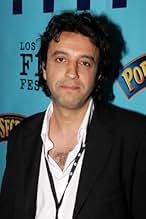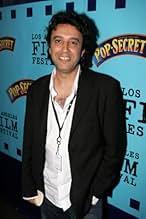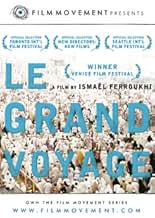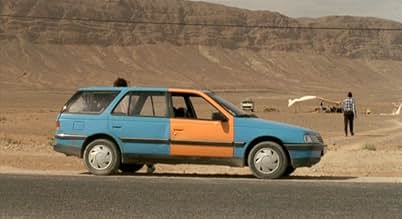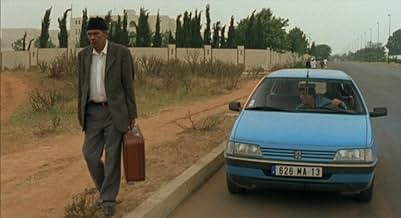Le grand voyage
- 2004
- Tous publics
- 1h 48min
NOTE IMDb
7,2/10
2,6 k
MA NOTE
Reda, un jeune Franco-marocain et son vieux père roulent du sud de la France jusqu'à La Mecque pour que ce dernier puisse faire son pèlerinage. Initialement distants, ils apprennent progress... Tout lireReda, un jeune Franco-marocain et son vieux père roulent du sud de la France jusqu'à La Mecque pour que ce dernier puisse faire son pèlerinage. Initialement distants, ils apprennent progressivement à se connaître.Reda, un jeune Franco-marocain et son vieux père roulent du sud de la France jusqu'à La Mecque pour que ce dernier puisse faire son pèlerinage. Initialement distants, ils apprennent progressivement à se connaître.
- Réalisation
- Scénario
- Casting principal
- Nomination aux 1 BAFTA Award
- 4 victoires et 3 nominations au total
Diyan Machev
- L'homme bavard
- (as Dean Matchev)
Erol Atac
- Douanier turc 1
- (as Erol Ataç)
Avis à la une
LE GRAND VOYAGE is a gentle miracle of a film, a work made more profound because of its understated script by writer/director Ismaël Ferroukhi who allows the natural scenery of this 'road trip' story and the sophisticated acting of the stars Nicolas Cazalé and Mohamed Majd to carry the emotional impact of the film. Ferroukhi's vision is very capably enhanced by the cinematography of Katell Djian (a sensitive mixture of travelogue vistas of horizons and tightly photographed duets between characters) and the musical score by Fowzi Guerdjou who manages to maintain some beautiful themes throughout the film while paying homage to the many local musical variations from the numerous countries the film surveys.
Reda (Nicolas Cazalé) lives with his Muslim family in Southern France, a young student with a Western girlfriend who does not seem to be following the religious direction of his heritage. His elderly father (Mohamed Majd) has decided his time has come to make his Hadj to Mecca, and being unable to drive, requests the reluctant Reda to forsake his personal needs to drive him to his ultimate religious obligation. The two set out in a fragile automobile to travel through France, into Italy, and on through Bulgaria, Croatia, Slovenia, and Turkey to Saudi Arabia. Along the trip Reda pleads with his father to visit some of the interesting sights, but his father remains focused on the purpose of the journey and Reda is irritably left to struggle with his father's demands. On their pilgrimage they encounter an old woman (Ghina Ognianova) who attaches herself to the two men and must eventually be deserted by Reda, a Turkish man Mustapha (Jacky Nercessian) who promises to guide the father/son duo but instead brings about a schism by getting Reda drunk in a bar and disappearing, and countless border patrol guards and custom agents who delay their progress for various reasons. Tensions between father and son mount: Reda cannot understand the importance of this pilgrimage so fraught with trials and mishaps, and the father cannot comprehend Reda's insensitivity to the father's religious beliefs and needs. At last they reach Mecca where they are surrounded by hoards of pilgrims from all around the world and the sensation of trip's significance is overwhelming to Reda. The manner in which the story comes to a close is touching and rich with meaning. It has taken a religious pilgrimage to restore the gap between youth and old age, between son and father, and between defiance and acceptance of religious values.
The visual impact of this film is extraordinary - all the more so because it feels as though the camera just 'happens' to catch the beauty of the many stopping points along the way without the need to enhance them with special effects. Nicolas Cazalé is a superb actor (be sure to see his most recent and currently showing film 'The Grocer's Son') and it is his carefully nuanced role that brings the magic to this film. Another fine film from The Film Movement, this is a tender story brilliantly told. Highly recommended.
Grady Harp
Reda (Nicolas Cazalé) lives with his Muslim family in Southern France, a young student with a Western girlfriend who does not seem to be following the religious direction of his heritage. His elderly father (Mohamed Majd) has decided his time has come to make his Hadj to Mecca, and being unable to drive, requests the reluctant Reda to forsake his personal needs to drive him to his ultimate religious obligation. The two set out in a fragile automobile to travel through France, into Italy, and on through Bulgaria, Croatia, Slovenia, and Turkey to Saudi Arabia. Along the trip Reda pleads with his father to visit some of the interesting sights, but his father remains focused on the purpose of the journey and Reda is irritably left to struggle with his father's demands. On their pilgrimage they encounter an old woman (Ghina Ognianova) who attaches herself to the two men and must eventually be deserted by Reda, a Turkish man Mustapha (Jacky Nercessian) who promises to guide the father/son duo but instead brings about a schism by getting Reda drunk in a bar and disappearing, and countless border patrol guards and custom agents who delay their progress for various reasons. Tensions between father and son mount: Reda cannot understand the importance of this pilgrimage so fraught with trials and mishaps, and the father cannot comprehend Reda's insensitivity to the father's religious beliefs and needs. At last they reach Mecca where they are surrounded by hoards of pilgrims from all around the world and the sensation of trip's significance is overwhelming to Reda. The manner in which the story comes to a close is touching and rich with meaning. It has taken a religious pilgrimage to restore the gap between youth and old age, between son and father, and between defiance and acceptance of religious values.
The visual impact of this film is extraordinary - all the more so because it feels as though the camera just 'happens' to catch the beauty of the many stopping points along the way without the need to enhance them with special effects. Nicolas Cazalé is a superb actor (be sure to see his most recent and currently showing film 'The Grocer's Son') and it is his carefully nuanced role that brings the magic to this film. Another fine film from The Film Movement, this is a tender story brilliantly told. Highly recommended.
Grady Harp
10PWNYCNY
This movie is great! This movie is beautiful! Finally, a movie that portrays Moslems as PEOPLE, no stereotypes here. This movie is driven by the story, by the acting and above all by its theme, that of cultural affirmation and discovery. They may seem like clichés but they are not, at least not in this movie. The vista of the Grand Mosque of Mecca is absolutely stupendous and the audience is given a glimpse of a side of the Moslem world that is rarely of ever shown in the West. Here the people are caring, supportive, devout, tolerant and devoted to each other. What a welcomed and way overdue departure from the usual negative portrayals of Arabs. Outstanding movie.
You'd think you're in for some serious sightseeing when the premise of the movie takes place primarily between two characters as they travel 3000 miles or so from France to Saudi Arabia, going through most of Europe - Italy, Bulgaria, Croatia, Slovenia, Turkey, before arriving in the Middle East. But this is not a tour, and there are no stopovers for soaking in the sights.
Reda's father is in his twilight years, and wishes to do the Haj. However, since walking and taking the mule is out of the question, he chooses to travel to Mecca by car. He can't drive, and therefore enlists the help of Reda, to his son's protest, to get him there in their broken down vehicle.
But Reda doesn't see the point of having him go along, when his dad could opt for the plane. He resents the idea of having put his personal life on hold for this pilgrimage he couldn't understand. And hence, we set off in this arduous journey with father and son, being not the best of pals.
The beauty of this movie is to witness the development of the father and son pair, the challenges they face, the weird people they meet, having to duke it out in varied weather conditions, and alternating rest stops between motels and sleeping in the car. We see an obvious generation gap in them trying to communicate to each other, the father trying to impose on his son, and the son trying to assert himself as an adult, but circumstances we see, reveal that Reda is quite a fish out of water. Through the many encounters, they actually team up quite well despite their differences.
It's perhaps quite apt to have this film released here last week to coincide with Hari Raya Haji, and having the opportunity to watch our protagonists join the other pilgrims in their Haj. The final scene in Mecca is truly a sight to behold, and you too would feel the claustrophobia and fear as Reda tries to hunt down his dad amongst the thousands of people congregating. The sights of Europe were perhaps deliberately not dwelled upon, so as to build up the anticipation of and focus on the final destination.
It certainly rang home the thought of telling and showing loved ones how much you appreciate them for who they are. Don't miss this, and yes, book early - I was pleasantly surprised that this evening's session was still a full house.
Reda's father is in his twilight years, and wishes to do the Haj. However, since walking and taking the mule is out of the question, he chooses to travel to Mecca by car. He can't drive, and therefore enlists the help of Reda, to his son's protest, to get him there in their broken down vehicle.
But Reda doesn't see the point of having him go along, when his dad could opt for the plane. He resents the idea of having put his personal life on hold for this pilgrimage he couldn't understand. And hence, we set off in this arduous journey with father and son, being not the best of pals.
The beauty of this movie is to witness the development of the father and son pair, the challenges they face, the weird people they meet, having to duke it out in varied weather conditions, and alternating rest stops between motels and sleeping in the car. We see an obvious generation gap in them trying to communicate to each other, the father trying to impose on his son, and the son trying to assert himself as an adult, but circumstances we see, reveal that Reda is quite a fish out of water. Through the many encounters, they actually team up quite well despite their differences.
It's perhaps quite apt to have this film released here last week to coincide with Hari Raya Haji, and having the opportunity to watch our protagonists join the other pilgrims in their Haj. The final scene in Mecca is truly a sight to behold, and you too would feel the claustrophobia and fear as Reda tries to hunt down his dad amongst the thousands of people congregating. The sights of Europe were perhaps deliberately not dwelled upon, so as to build up the anticipation of and focus on the final destination.
It certainly rang home the thought of telling and showing loved ones how much you appreciate them for who they are. Don't miss this, and yes, book early - I was pleasantly surprised that this evening's session was still a full house.
Reda is a young Frenchman of Moroccan descent. Despite his Muslim heritage, he is very French in attitudes and values. Out of the blue, his father announces that Reda will be driving him to the Hajj (pilgrimage) to Mecca--something that Reda has no interest in doing but agrees only out of obligation. As a result, from the start, Reda is angry but being a traditional Muslim man, his father is difficult to talk to or discuss his misgivings. Both father and son seem very rigid and inflexible--and it's very ironic when the Dad tells his son that he should not be so stubborn.
When I read the summary, it talks about how much the characters grew and began to know each other. However, I really don't think they did and that is the fascinating and sad aspect of the film. Sure, there were times of understanding, but so often there was an undercurrent of hostility and repression. I actually liked this and appreciated that there wasn't complete resolution of this--as it would have seemed phony.
Overall, the film is well acted and fascinating--giving Westerners an unusual insight into Islam and the Hajj. It also provides a fascinating juxtaposition of traditional Islam and the secular younger generation. While the slow pace and lack of clarity about the relationship throughout the film may annoy some, I think it gave the film intense realism and made it look like a film about people--not some formula. A nice and unusual film.
When I read the summary, it talks about how much the characters grew and began to know each other. However, I really don't think they did and that is the fascinating and sad aspect of the film. Sure, there were times of understanding, but so often there was an undercurrent of hostility and repression. I actually liked this and appreciated that there wasn't complete resolution of this--as it would have seemed phony.
Overall, the film is well acted and fascinating--giving Westerners an unusual insight into Islam and the Hajj. It also provides a fascinating juxtaposition of traditional Islam and the secular younger generation. While the slow pace and lack of clarity about the relationship throughout the film may annoy some, I think it gave the film intense realism and made it look like a film about people--not some formula. A nice and unusual film.
I don't know...Maybe it's just because it's an impressive tribute to some Muslim religious action(hajj)but I just felt the movie is so underrated. I just can't believe that the movie has just been voted by only 223 people so far given that the movie was produced in 2004 and it has won many awards since then.About the movie...it's one of those well-acted sweet movies.Reda,a French teenager due to sit for Baccalauréat, is asked by his devout elderly father to take him to Mecca.Strange as it may seem(if one doesn't know much about Islam)the father wants his son to drive them from their home in France to Saudia Arabia on a once-in-a-lifetime religious pilgrimage.The generation gap between the father and the son is based on simple enough terms('you may know how to read and write, but you know nothing about life,' the unnamed father to his son)but some sort of bromidic generation gap literature is avoided.Bot of them are affectionate in their frustrations.The father never speaks in French though Reda understands Arabic but can only seem to answer in French. Though they encounter many people on the road: "There's the scary old woman they pick up in the Bosnian border on the way to Belgrade, and the talkative Mustafa(Jacky Nercessian), who helps them out at the border of Turkey,the reticent and shy women wearing burqas on the way to Damascus" the focus is always on the mismatched father and son.There is not much of a conversation in the movie which makes it enjoyable to your eyes. You see magnificent views in every city they go.The director shows you even the Blue Mosque and the Hagia Sophia even though the movie is not relatively long.
Generally I don't like movies which don't have enough dialogs and which take their power from camera subtleties but this one was really great.Despite some unanswered details(like Reda's unseen French girlfriend)the movie appeals to senses.Great work of art and remember this movie is Ismaël Ferroukhi's debut.
Generally I don't like movies which don't have enough dialogs and which take their power from camera subtleties but this one was really great.Despite some unanswered details(like Reda's unseen French girlfriend)the movie appeals to senses.Great work of art and remember this movie is Ismaël Ferroukhi's debut.
Le saviez-vous
- Citations
Reda: Where is my cell-phone?
The Father: It's in a garbage can 200 miles away.
- ConnexionsFeatured in Humbert Balsan, producteur rebelle (2006)
Meilleurs choix
Connectez-vous pour évaluer et suivre la liste de favoris afin de recevoir des recommandations personnalisées
Détails
- Date de sortie
- Pays d’origine
- Langues
- Aussi connu sous le nom de
- The Great Journey
- Lieux de tournage
- Sociétés de production
- Voir plus de crédits d'entreprise sur IMDbPro
Box-office
- Montant brut mondial
- 278 814 $US
- Durée
- 1h 48min(108 min)
- Couleur
- Mixage
- Rapport de forme
- 1.85 : 1
Contribuer à cette page
Suggérer une modification ou ajouter du contenu manquant

